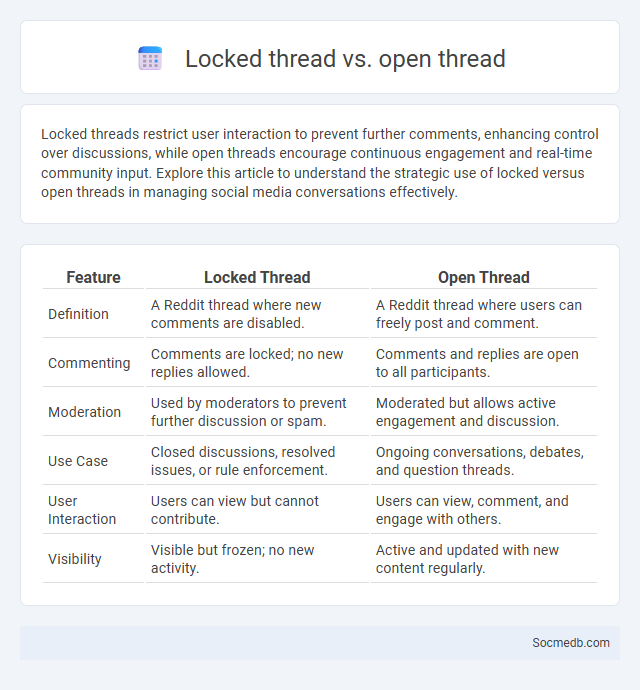
Photo illustration: Locked thread vs Open thread
Locked threads restrict user interaction to prevent further comments, enhancing control over discussions, while open threads encourage continuous engagement and real-time community input. Explore this article to understand the strategic use of locked versus open threads in managing social media conversations effectively.
Table of Comparison
| Feature | Locked Thread | Open Thread |
|---|---|---|
| Definition | A Reddit thread where new comments are disabled. | A Reddit thread where users can freely post and comment. |
| Commenting | Comments are locked; no new replies allowed. | Comments and replies are open to all participants. |
| Moderation | Used by moderators to prevent further discussion or spam. | Moderated but allows active engagement and discussion. |
| Use Case | Closed discussions, resolved issues, or rule enforcement. | Ongoing conversations, debates, and question threads. |
| User Interaction | Users can view but cannot contribute. | Users can view, comment, and engage with others. |
| Visibility | Visible but frozen; no new activity. | Active and updated with new content regularly. |
Introduction to Thread Statuses: Locked vs Open
Thread statuses in social media platforms determine user interaction levels, with "Locked" threads preventing any further comments or replies, ensuring discussions remain closed for moderation or relevance reasons. Open threads allow unrestricted user engagement, facilitating dynamic conversations and real-time community input. Choosing between locked and open statuses impacts content visibility, user participation, and moderation efficiency across platforms like Facebook, Reddit, and Twitter.
Defining Open Threads
Open threads on social media are interactive posts where users freely share opinions, questions, or updates without strict topic restrictions, fostering dynamic engagement. These threads encourage your participation by allowing diverse conversations to evolve naturally, increasing visibility and community interaction. Platforms like Reddit and Twitter often utilize open threads to boost user-generated content and real-time discussions.
What is a Locked Thread?
A locked thread on social media is a conversation or post where no new comments or replies can be added, effectively freezing the discussion. This feature is used to prevent spam, off-topic messages, or heated arguments from escalating, maintaining a controlled environment. If you encounter a locked thread, you can still read all existing messages but cannot contribute further to that particular discussion.
Similarities and Differences Between Open and Locked Threads
Open threads on social media allow any user to view and contribute, fostering broad engagement and diverse perspectives, while locked threads restrict interactions to selected participants or prevent further comments entirely, enhancing control over content and reducing spam. Both formats support community discussions but differ significantly in accessibility, moderation, and privacy levels. Choosing between open and locked threads depends on the desired balance of inclusivity and content management within social media platforms.
Why Do Forums Use Locked Threads?
Forums use locked threads to maintain order and enhance user experience by preventing the spread of outdated or incorrect information. Locking threads helps moderators control spam, reduce off-topic discussions, and protect sensitive or resolved issues from unnecessary comments. Your participation is guided towards relevant, constructive conversations when threads are locked, ensuring the forum remains a valuable resource for all members.
Benefits of Open Threads for Community Engagement
Open threads on social media foster authentic community engagement by encouraging diverse conversations without topic restrictions, boosting interaction and user participation. They create a dynamic space where members exchange ideas, support, and feedback, enhancing your brand's visibility and trust. Embracing open threads increases organic reach and strengthens relationships by enabling more personalized and spontaneous connections within your audience.
Common Scenarios for Locking Threads
Social media platforms often lock threads to prevent harassment, spam, or the spread of misinformation that can escalate tensions within communities. You might encounter locked threads when discussions violate community guidelines, involve hate speech, or become excessively off-topic or repetitive, ensuring a safer and more respectful environment. Moderation policies aim to maintain constructive conversations by limiting disruptive behavior and protecting users from harmful content.
Impact of Thread Status on User Participation
Thread status significantly influences user participation by signaling the activity level and engagement within a discussion. An active thread with recent posts encourages You to contribute more frequently, fostering real-time interaction and community growth. Conversely, dormant or closed threads tend to deter user involvement, reducing overall engagement and limiting the flow of fresh content.
Moderation Best Practices: When to Lock or Keep Threads Open
Effective social media moderation balances user engagement with community safety by strategically deciding when to lock or keep threads open. Lock threads when conversations become hostile, off-topic, or violate community guidelines to prevent escalation and maintain a respectful environment. Your moderation approach should prioritize fostering constructive dialogue while protecting users from harmful content and spam.
Conclusion: Choosing the Right Thread Status for Your Community
Selecting the right thread status on social media platforms directly influences community engagement and content visibility, optimizing user interaction and satisfaction. Active, closed, or pinned statuses each serve strategic roles in managing conversations and highlighting priority topics. Aligning thread settings with community goals ensures a healthier, more dynamic social environment tailored to audience needs.
 socmedb.com
socmedb.com